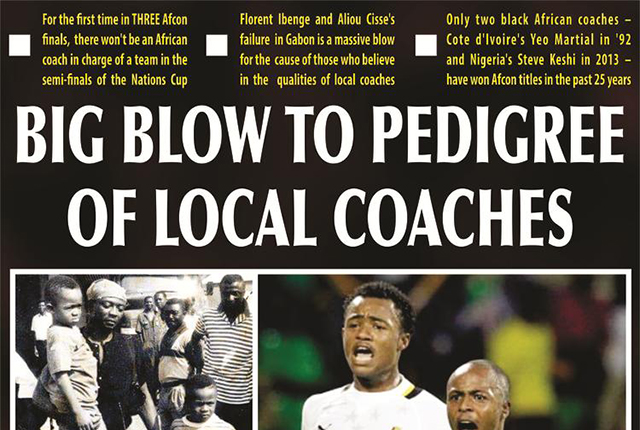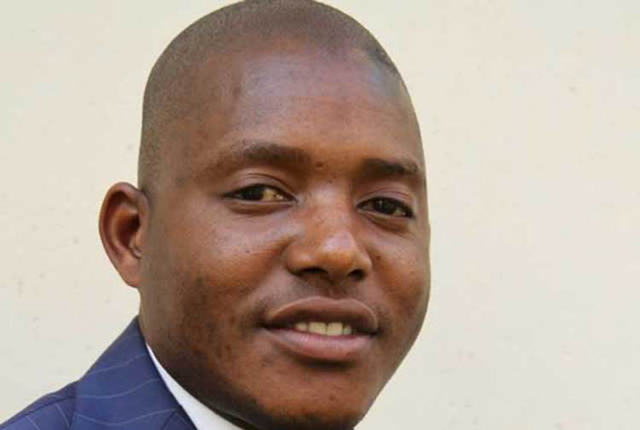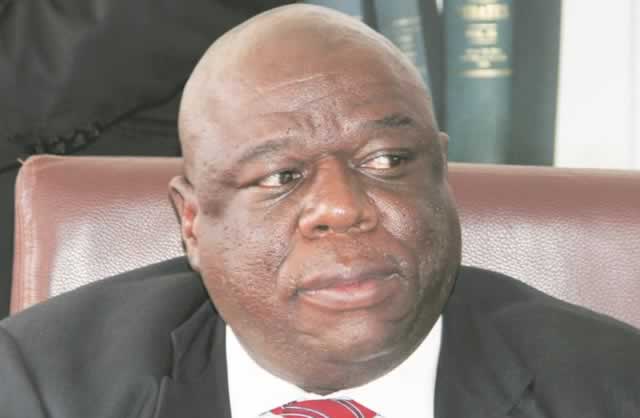Big blow for local coaches

Robson Sharuko Senior Sports Editor—-
WHEN the Ayew brothers — Jordan and Andre — scored on Sunday night to power their Black Stars into the 2017 Nations Cup semi-finals, the two sons of Ghanaian legend Abedi Pele combined to strike a significant blow to the pedigree of black African football coaches.
The last man standing, Florent Ibenge, a 55-year-old Congolese coach who learnt his trade in Belgium and France before coaching in China and is widely regarded as the biggest hope for black African coaches, was blown away from Gabon by those two deadly blows struck by the Ayew brothers.
After guiding the DRC to third-place at the 2015 Nations Cup finals and success at the 2016 African Nations Championships in Rwanda, Ibenge — who combines roles as coach of his national team and Kinshasa giants AS Vita — arrived in Gabon carrying a heavy burden to prove to a suspicious world that black African coaches can also deliver at such high-profile tournaments.
With only two black African coaches having successfully helped their countries lift the AFCON title in the past 25 years — Ivorian Yeo Martial leading his country to success at the 1992 Nations Cup finals and Nigeria’s Steve Keshi winning the title with his Super Eagles in South Africa in 2013 — the reasons for those fears appear justified.
But Keshi’s success in 2013 and Ibenge’s third-place finish with his Congolese side two years later, seemed to suggest the black African coaches were fighting back to prove those who doubt them were wrong.
And after leading his country to top their group in Gabon, beating Morocco (1-0), Togo (3-1) and holding defending champions Cote d’Ivoire to a 2-2 draw, Ibenge appeared firmly on the right course but a 1-2 defeat to the Ghanaians in the quarter-finals on Sunday night brought an abrupt end to his Gabonese adventure.
Having finished third at the 2015 AFCON finals, Ibenge — who also took AS Vita to the final of the CAF Champions League — will probably feel a sense of underachievement in Gabon and this will provide ammunition to those who have always questioned whether black African coaches can be trusted to provide the technical and tactical leadership needed at such high-profile tournaments.
Less than 24 hours earlier, another rising black African coach, Aliou Cisse, had also fallen at the quarter-final stage with his gifted Senegalese side, whom some had tipped to go all the way and win their first Nations Cup title in Gabon, being defeated by a tactical masterclass by the Indomitable Lions of Cameroon.
With Callisto Pasuwa’s Zimbabwe Warriors and Baciro Cande’s Wild Dogs of Guinea-Bissau having crashed out at the group stages without a win to their credit, losing four matches and drawing two, Ibenge and Cisse’s fall at the quarter-finals means that — for the first time in four years — there won’t be a black African coach in the semi-finals of the Nations Cup.
Interestingly, at the 2013 AFCON finals in South Africa, two black African coaches — Keshi and Kwesi Appiah of Ghana — led their countries to the semi-finals of the tournament with the former ultimately winning the title with his Super Eagles, ending 19-years of waiting for Africa’s most populous nation to become champions of the continent.
But the gains recorded by Keshi and Appiah were soon eroded two years later as Bafana Bafana, under local coach Shakes Mashaba, finished winless in their group at the 2015 AFCON finals, drawing one drew one (1-1 against Senegal) and losing two (1-3 against Algeria and 1-2 against Ghana), scoring three and conceding six goals to take home just one point.
The South Africans finished bottom of their group.
Zambia, winners of the AFCON title in Gabon in 2012, also finished bottom of their group, failing to win a game, drawing two (1-1 against DRC and 0-0 against Cote d’Ivoire) and losing 1-2 to Cote d’Ivoire, scoring two and conceding three goals as they finished bottom of their group after taking home just two points at the 2015 Nations Cup finals under local coach Honour Janza.
Ibenge, though, provided hope for the black African coaches with his Congolese side finishing third at the 2015 AFCON finals despite having failed to win any of their three group games which they drew.
But, after their quarter-final elimination in Gabon on Sunday, some will say this is another reality check for black African coaches.
And, as the Ayew brothers wheeled away in celebrations on Sunday night, after guiding Ghana to victory over the DRC, they fuelled fresh doubts about the suitability of black African coaches, when it comes to guiding their countries to success at the AFCON finals and their ability to fill in the big shoes of legendary Ghanaian coach Charles Kumi Gyamfi, who led the Black Stars to three of their four titles.
The brothers’ heroics over the Congolese on Sunday comes exactly 20 years to the day their father, Abedi Pele, played a big part as the Black Stars beat the same opponents, in an AFCON quarter-final battle in South Africa in ’96, which the Black Stars won 1-0, with Tony Yeboah scoring the only goal of the match.
A striking image of Pele, carrying his two young sons — Jordan (then a four-year-old) and Andre (then a six-year-old) — to the match, has since emerged.
The DRC, then known as Zaire, had thrashed Zimbabwe 5-0 in Kinshasa, in a match boycotted by most of the Warriors’ first-team players in the wake of the outbreak of the Ebola crisis in that country, to qualify for the ’96 Nations Cup finals.
And, as fate would have it, the Black Stars would inflict the fatal blow on the Warriors’ quest for a place at the ’98 Nations Cup finals with a 2-1 victory in Accra, with Pele opening the scoring in the 22nd minute and Emmanuel Osei Kuffour doubling their tally in the 39th minute to ensure that Shepherd Muradzikwa’s pile-driver was just a mere consolation.
Just like in the ’96 AFCON qualifiers, fate had conspired to hammer a sickening blow to the Warriors’ campaign with their 3-0 away win over Sudan in Khartoum being nullified after the Sudanese pulled out of the qualifiers because of unrest which had erupted in the eastern parts of their country.










Comments